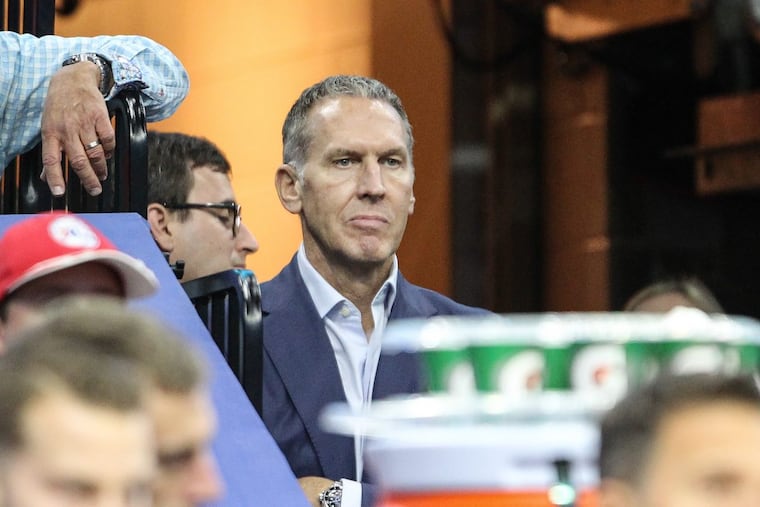Why famous people like Bryan Colangelo use burner accounts
Burner accounts allow celebrities to take part in the sharing culture of social media and post about things that are truly of interest to them - but perhaps not in tune with their public persona

The general manager of the 76ers, Bryan Colangelo, may have breached his employer's trust by posing anonymously on Twitter. But among people in the public eye, he's not the only one going undercover to share on social media without accountability.
Late Tuesday, the Ringer, an online news organization, published an extensive report indicating that Colangelo used a handful of anonymous Twitter accounts to criticize players, outline team strategy, and defend himself (and his fashion choices). If the story is true, Colangelo also went so far as to ask journalists to question players about previously unreported medical information and disclose confidential trade discussions. In a statement Wednesday, the Sixers announced the organization was investigating the "serious" allegations.
Prominent people didn't invent burner accounts — people from parents to tweens use them to monitor or post in privacy — though they allow stars to be, well, just like us.
They can, for instance, be like Lorde, and review onion rings from around the world. And they can take part in the sharing culture of social media and post about things that are truly of interest to them but perhaps not in tune with their public persona, said Ken Wisnefski, founder and CEO of Camden-based digital marketing agency Webimax. He also expects more situations like Colangelo's in the future.
Burner accounts don't bring down celebrities; their content can. For example, if Lorde had used her undercover Instagram account to bash other contemporary musicians — not review fried appetizers — Wisnefski said, that could have been problematic for her reputation.
And if Colangelo were using a fake account to review movies, "this wouldn't really be a big story."
"There are absolutely times and instances where having anonymous accounts really doesn't have much impact on what goes on," he said, "and is maybe even an opportunity for celebrities and other people that have other interests outside what they're known for."
The danger comes when celebrities operate an account to deceive. The fake internet personas most often used by people who want to defend themselves (and awkwardly speak about themselves in the third person) are sometimes called "sock puppets."
NBA star Kevin Durant of the Golden State Warriors used a ghost account to defend himself on Twitter. Jane Skinner Goodell, wife of NFL commissioner Roger Goodell, used Twitter to secretly back her husband online.
Others have used fake accounts to simply lurk — to follow friends, family and reporters solely to keep up with things without anyone being able to track their activity. Longtime Duke University basketball coach Mike Krzyzewski admitted to using fake Twitter and Instagram accounts to keep tabs on players. NBA Commissioner Adam Silver said he did the same.
The sports world hasn't cornered the market on burner accounts. The actor Jon Hamm apparently has a "stealth" Instagram account, as does Prince Harry, who reportedly followed now-wife Meghan Markle and some charities he works with. Kim Kardashian revealed she has a secret Snapchat, and Kate Moss said she has a secret Instagram for "spying purposes."
And don't forget Washington. Former FBI Director James Comey used the Twitter account @ProjectExile7 to keep tabs on news and other happenings. While it wasn't a fake account, President Trump is known to have communicated decades ago with reporters under an alias — sometimes posing as "John Miller" or "John Barron," fake spokesmen and publicists. And former New York Congressman Anthony Weiner notoriously used the alias Carlos Danger for more nefarious reasons: to share explicit photos with women.
Those outside the rich and famous have anonymous accounts, too. Twitter trolls have been well-documented. And on Instagram, there's the "Finsta," a fake account often used by teenagers as a place to share deeply personal feelings with a carefully curated list of followers.
The posts attributed to Colangelo weren't so innocuous, though.
He was "callous," Wisnefski said, with something "as simple as a burner Twitter account."